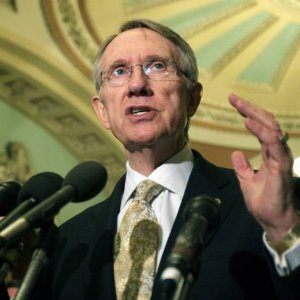Player Penalties Removed from Reid/Kyl U.S. Online Poker Bill

 According to Poker Players Alliance Vice President of Player Relations Rich TheEngineerMuny, the latest draft of a proposed online poker bill from Senate Majority Leader Harry Reid (pictured) and UIGEA proponent Jon Kyl is void of language that penalized players for placating unauthorized poker sites. Talk about the billor read its text. The latter is courtesy of QuadJacks.
According to Poker Players Alliance Vice President of Player Relations Rich TheEngineerMuny, the latest draft of a proposed online poker bill from Senate Majority Leader Harry Reid (pictured) and UIGEA proponent Jon Kyl is void of language that penalized players for placating unauthorized poker sites. Talk about the billor read its text. The latter is courtesy of QuadJacks.
The bill is called the Internet Gambling Prohibition, Poker Consumer Protection, and Strengthening UIGEA Act and, according to attorney Ian Imrich, punishes rooms that took real money play from Americans following the UIGEA’s passage in 2006.
Imrich wrote in an analysis published on Friday, “The draft language specifically would prohibit [post-UIGEA real money poker sites] from being licensed for five years after enactment unless that party could persuade a regulator that such a business had not ever violated either U.S. Federal or state gambling laws.”
Muny called the half-decade ban on post-UIGEA sites a “penalty box” and Tweeted, “The bill mandates a 5-yr penalty box for sites offering poker after UIGEA that cannot prove zero violations of fed or state law.”
Imrich spoke on the financial components of the bill, saying that it “imposes what effectively amounts to a 16% Gross Gaming Revenue tax on i-poker site operators.” Muny added that if the bill were to pass, presumably during the lame duck session after the elections, the soonest we’d see legalized online poker in the United States is 16 months later.
 The bill calls for the prohibition of “internet gambling involving house-banked games or sports betting,” while at the same time only allowing online poker in states and on tribal lands that elect to opt in. The bill also reinforces the fact that online lotteries should be limited to ticket sales and not offer house-backed or casino games.
The bill calls for the prohibition of “internet gambling involving house-banked games or sports betting,” while at the same time only allowing online poker in states and on tribal lands that elect to opt in. The bill also reinforces the fact that online lotteries should be limited to ticket sales and not offer house-backed or casino games.
A 10-year prison term is imposed for anyone who operates an illegal gambling site in violation of the draft bill, whose wrath expressly exempts companies located outside of the United States whose customer bases are also wholly located outside of the United States. The Department of Commerce’s new Office of Online Poker Oversight would be the regulatory body charged with enforcing the measure.
Up to three states or Indian Tribes dubbed “Experienced Qualified Bodies” will serve as benchmarks for other states and tribes interested in pursuing online poker. One of these will presumably be Nevada, which is already on the cusp of offering legal intrastate online poker.
The act calls for a variety of safeguards, including preventing underage gambling, blocking players outside an accepted jurisdiction, reporting of customer tax liabilities, prevention of financial crimes, deterrence of compulsive gambling, and ensuring “honest games.”
 Also included is a mandate to segregate player funds, a hot topic in the industry after Full Tilt’s failure to do so led to American and rest-of-world players being separated from their bankrolls. The draft calls for “appropriate safeguards to ensure player funds are held in accounts segregated from the funds of licensees and are otherwise protected from corporate insolvency, financial risk, or criminal or civil actions against the licensee.”
Also included is a mandate to segregate player funds, a hot topic in the industry after Full Tilt’s failure to do so led to American and rest-of-world players being separated from their bankrolls. The draft calls for “appropriate safeguards to ensure player funds are held in accounts segregated from the funds of licensees and are otherwise protected from corporate insolvency, financial risk, or criminal or civil actions against the licensee.”
According to Muny, Kyl, who championed the UIGEA’s passage six years ago, is behind an online poker bill because he is “concerned about an explosion of state-backed online casino gaming. He’s willing to compromise on poker to toughen the UIGEA.”
Muny gave his take on the draft bill on Facebook, saying, “I think it will be great for U.S. players. The current sites can’t last forever… IMO this gives us the strong foundation we’ll need going forward.”
Whether the bill will receive any attention after the elections remains to be seen. It first must be finalized and formally introduced. Then, it becomes a matter of whether it would pass as a standalone bill or, like the UIGEA, be attached to an unrelated piece of legislation.




